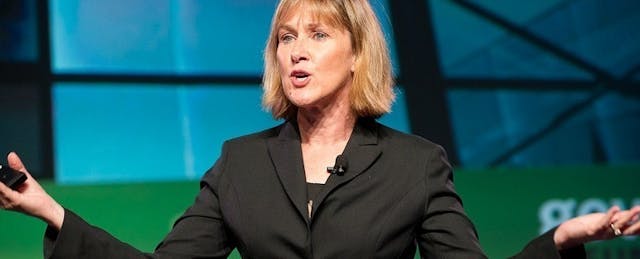Digital Promise just got, oh, say, a little more promising.
Karen Cator, formerly Director of the Office of Educational Technology in the U.S. Department of Education, has announced that she will take the job of chief executive at Digital Promise, the nonprofit authorized by Congress in September 2011, effective immediately. Her predecessor, Adam Frankel, said late last year that he was leaving Digital Promise to work on a book. Cator shared her news during the Tuesday morning session at the Education Innovation Summit, taking place this week in Scottsdale, AZ.
In an interview with EdSurge, Cator said that she was drawn to the nonprofit because its mission supports many of the goals laid out in the National Technology Plan, which she helped write in 2010 while at the Department of Education, including establishing better connections between entrepreneurs, educators and education researchers. "At this juncture we have an amazing opportunity to increase the learning potential of students everywhere," she added.
Digital Promise received about 150 applications for its director's job. Cator spent 17 years in public education as a teacher followed by a 11-year stint at Apple leading the company's advocacy work in education. But the biggest requirement for Digital Promise's new CEO is going to be transforming the ideas of technology can reshape into real practices that educators can share.
So far, Digital Promise has convened a group of 32 public district superintendents under the banner of the "League of Innovative Schools." Those schools--and the teachers and 2.5 million students they represent--are sharing stories of their best practices and aim to truth-squad some of the claims made for educational technology.
Jason Tomassini, Digital Promise's communications director, notes that Digital Promise is coordinating a number of projects with the League districts, notably including:
- A study of the effectiveness of teachers using digital technology that also also to describe more precisely the relevant teaching methods educators use. Tomassini expects Digital Promise will share initial results from that work this summer.
- A study of what happens when a resource-poor district gives teachers some funds to improve their classrooms. The 35,000-student Meridian, Idaho district encouraged its teachers to compete for "innovation grants" (on the order of a couple of thousand dollars apiece). A team of ethnographers is studying both how the teachers used the funds and the implications for student learning.
- A study of how to improve procurement of technology, done in conjunction with IDEO, which Tomassini says will result in a couple of initiatives with more details to be shared "very soon."
Digital Promise got its start with a $500,000 grant from the US Department of Education and has since raised $2 million from private groups including the Carnegie Corporation of New York, William and Flora Hewlett Foundation, and Bill and Melinda Gates Foundation.
Cator says her first job is to listen to Digital Promise's partners--educators, funders and others. Seems like she's already tuning her ears: although she had planned to officially begin her job in June, she now says she's already doing the job. Digital Promise will also go bicoastal, keeping an office in Washington but with Cator based in California.
Cator also said she aims to be an "advocate for innovative teachers." While at the Department of Education, Cator had proposed starting a "League of Innovative Teachers." Now she may have a chance to make good on that idea.
Editor's note: We've corrected Cator's past title.


